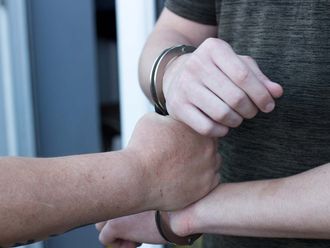Canberra: After 22 days on a boat fleeing Sri Lanka and more than five months in detention, asylum-seeker Jeevan Nanthakumar recently unpacked his suitcases in the home of an Australian pensioner couple.
Nanthakumar — a pseudonym — said he left his homeland and family in January due to “government problems and enemies in my village”.
“I went to India then was on a boat for 22 days, five days with no food and no water,” said the 26-year-old.
Nanthakumar and others on the boat were eventually picked up and transferred to the remote Australian territory of Christmas Island for a week, then to detention in Queensland state.
He is one of more than 7,000 asylum-seekers to arrive by boat this year, overwhelming detention centres.
In a bid to ease the strain, a homestay programme was announced in May in which Australian families temporarily house those seeking asylum while their permanent visa claims are processed.
The idea is to offer short-term accommodation to those leaving immigration detention on a bridging visa, and help them settle into the community.
“We helped him at the very beginning, my husband drove him to his first Red Cross meeting, showed him how to come back on a train,” said Martha, a retired English professor who offered shelter to Nanthakumar with her husband Phillip.
Their surname is not allowed to be used under the privacy policy of the Australian Homestay Network, an organisation that usually helps house international students.
“We also warned him he does not need to work for less than the minimum wage,” she added. “Other than that, he has been very independent. He has quickly found other Tamil people and a house to live in.”
Nanthakumar spent two weeks with Martha and Phillip at their house in a northern Sydney suburb before finding a more permanent place to live with other members of the Tamil community.
“I met people from Sri Lanka in the detention camps and I will live with them in a house,” he said.
Martha said she got involved after becoming increasingly concerned about the plight of asylum-seekers, many of whom have fled war and persecution.
“We got involved with Amnesty International, we got involved with the whole refugee situation and we wanted to more practically assist the situation,” she said.
“It’s a benefit for us to meet people from other countries and feel that we are helping.
“I think it’s a benefit for our son, who lives here as well, to broaden his understanding of what’s going on in the world. The learning goes both ways.”
So far, about 150 asylum-seekers have been placed with Australian families, for a maximum of six weeks via the Australian Homestay Network initiative.
The network’s executive chairman David Bycroft, who is working alongside the immigration department, said it was designed to help asylum-seekers adjust to Australian life.
“The Australian families help the asylum-seeker to use public transport, set up a bank account, fill in medical forms,” he said.
“All of the things that we take for granted in Australia, but a new person coming to the country needs help with.”
The host receives A$140 per week (Dh526) per asylum-seeker to cover costs.
“You wouldn’t do this programme if you wanted to make money out of it,” added Bycroft.
To live with a host family, asylum-seekers must meet a series of strict criteria controlled by the Department of Immigration and the scheme is only available to those who have been awarded a bridging visa.
“Prior to granting someone a bridging visa, we consider their health, making sure that we are confident on their identity, character, security risks and past behaviour,” an immigration department spokesperson explained.
Since the beginning of the year, the department has issued 3,424 such visas to illegal migrants who arrived by sea, allowing them to live and work in Australia until their permanent protection visa application is completed.
Accommodation with a host family is a new, and interesting, concept for the Australian Red Cross, which offers support to hundreds of boatpeople via its Asylum Seeker Assistance Scheme.
“For us it is important that there are range of different options to provide housing,” said the Red Cross’s Noel Clement.
Australia has long struggled to cope with the influx of boatpeople, many originally from Afghanistan, Sri Lanka, Iran and Iraq who make their way here via Asia.
Earlier this month, parliament passed a law allowing it to transfer asylum-seekers arriving by boat to Papua New Guinea and tiny Nauru to have their refugee claims processed.
It hopes the prospect of years in detention on remote Pacific islands will deter them from attempting the dangerous sea voyage, which has cost hundreds of lives over the past decade.












